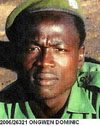
Testimony from former LRA fighters who were recently captured near Yambio in Sudan’s Western Equatoria state indicates that a notorious LRA commander, Dominic Ongwen, recently crossed into Sudan from the Democratic Republic of Congo.
Ongwen, who was indicted by the International Criminal Court for crimes against humanity and war crimes in 2005, is part of the LRA’s top leadership, second or third in command after leader Joseph Kony.
One of Ongwen’s “wives,” who was captured by the Ugandan army in July, said that the LRA group had moved to Western Equatoria state. Unlike in the past where LRA fighters attacked southern Sudanese towns from bases in Congo, Onwgen’s group is now based in Western Equatoria state. All fighters have new guns and uniforms and plenty of bullets, she said, adding that she did not know where the supplies came from. Former LRA fighters from groups operating in CAR and Congo said until recently that they were using old guns and that bullets were scarce.
According to former fighters, Kony put Ongwen ‘in charge’ of the LRA in Congo soon after Operation Lightning Thunder, the Ugandan army offensive against LRA bases in northern Congo on December 14, 2008. In the absence of Kony – who is believed to have been in Central African Republic since May 2009 – Ongwen commanded all LRA groups scattered in Haut Uele and Bas Uele districts of Congo’s Province Orientale. Groups under Ongwen are thought to have carried out the so-called Makombo massacre in Congo where LRA fighters killed over 350 civilians in December 2009.
Onwgen’s passage to Sudan in July with a reported 30 fighters is worrying. Sudan is preparing for a very important referendum early next year, and the LRA has a proven record of destabilizing entire regions with few soldiers. Officers from the southern Sudanese army, or SPLA, allege the Khartoum government is supporting the LRA in return for launching attacks in the South. They say Khartoum officials who do not want the South to secede from the North – an almost certain outcome of the upcoming referendum – are using the LRA to destabilize the South to create the impression the SPLA cannot provide security in the long run. President Museveni of Uganda has made similar accusations, but officials of the Omar Al Bashir government vehemently deny the links.
While it remains unclear whether Khartoum is supplying Kony’s men or not, LRA attacks in the Sudanese states of Western Equatoria and Western Bahr el Ghazal certainly intensified this summer. It is likely that the recent spike of LRA violence in Western Equatoria is attributed to Ongwen’s group. (Attacks in Western Bahr el Ghazal are likely carried out by another LRA group from bases in neighbouring Central African Republic.) On June 20, 2010 an LRA group attacked near the town of Nzara in Western Equatoria, abducting and later killing six people. After an LRA attack in the village of Ukcuo, in the state capital Yambio, a group of Arrow Boys clashed with an LRA group capturing four women. Additional LRA attacks were registered on July 30 and August 2 in the towns of Ezo and Nzara respectively. Three people were killed and six were injured.
Photo: LRA commander Dominic Ongwen in file photo from International Criminal Court

